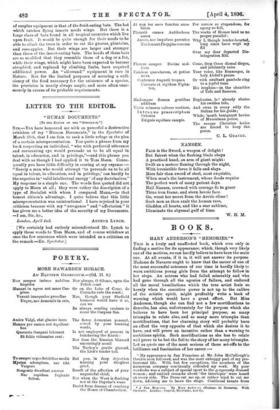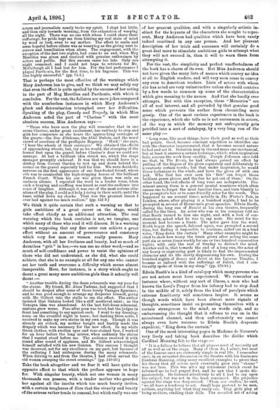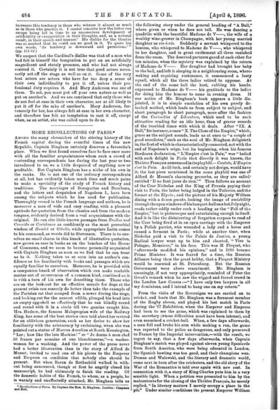BOOKS.
MARY ANDERSON'S "MEMORIES." • THIS is a lively and unaffected book, which errs only in finding a motive for its appearance, which, though very likely one of the motives, we can hardly believe to have been the main one. At all events, if it is, it will not answer its purpose.
Madame de Navarro ought to know that the career of one of the most successful actresses of our time is hardly likely to warn ambitious young girls from the attempt to follow in her steps. An actress who had failed miserably and who- had gone through all the agonies of failure, and endured all the moral humiliations which the true artist feels so. keenly when the executive power is not up to the calibre of the artistic spirit, might profitably write a book of
warning which would have a great effect. But Misa Anderson, though she can find not a few modifications to has also, unfortunately for the purpose which she
believes to have been her principal purpose, so many triumphs to relate also, and so many more triumphs than modifications, that her charming story will probably have an effect the very opposite of that which she desires it to. have, and will prove an incentive rather than a warning to spirits. Such mortifications as she has to relate will prove to be but the foil to the story of her many triumphs.
Let us quote one of the most serious of these set-offs to the brilliance and fascination of her career :— "My appearance in San Francisco at Mr. John McCullough's: theatre soon followed, and was the most unhappy part of my pro- fessional life. With but few exceptions, the members of the numerous company continually ridiculed my work. My poor- wardrobe was a subject of special sport to the gorgeously-dressed women ; and unkind remarks about 'the interloper' were heard on every side. The Press cut me up, or rather tried to cut me down, advising me to leave the stage. Continual taunts from • ,4 Few Memories. By Mary Ander. on (Madams de Navarro). With Portraits. London : Osgood, Mcilvaine. and Co. actors and journalists nearly broke my spirit. I slept but little, and then only towards morning, from the exhaustion of weeping all the night. There was no one with whom I could share these sufferings, for pride kept me from hinting my real state of mind by word or look, even to my mother. The effort to smile and seem hopeful before others was as wearying as the giving vent to sorrow and humiliation when alone. The engagement, with the exception of the last two nights, had come to an end, when Meg Merrilies was given and received with genuine enthusiasm by -actors and public. But this success came too late. Only one night remained, and I could not hope to retrieve for Mr. McCullough all I had lost for him. For the last performance I played Parthenia, for the first time, to his Ingomar. This was also highly successful." (pp. 74-5.) That is perhaps the most effective of the warnings which Mary Anderson has to give, and we think we may safely say 'that even its effect is quite spoiled by the success of her acting in the part of Meg Merrilies and Parthenia, with which it concludes. For the rest, the failures are mere jokes compared with the numberless instances in which Mary Anderson's pluck and determination triumphed over her difficulties. speaking of the play, Comedy and Tragedy, in which Miss Anderson acted the part of " Clarisse " with the most .absolute success, Miss Anderson says :— " Those who have seen the play will remember that in one -scene Clarisse, under great excitement, has suddenly to stop and gain her composure as she bears the approaching carriages of the guests—the Duo d'Orleans, the Abbe Dubois, and the usual -crowd of courtiers of the profligate Regency. Hark ! ' she says, "I hear the wheels of their carriages.' We obtained the effects of approaching wheels, but, try as we would, the stamping of the -horses' feet upon the gravel before Clarisse's door we could not manage. At last a brilliant idea struck me, which the stage ananager promptly endorsed. It was that we should have in a donkey from Covent Garden to trot up and down behind tho scenes on the gravel especially laid for him. We were decidedly nervous on the first appearance of our four-footed friend, whose role was to counterfeit the high-stepping horses of the brilliant French Court. When his cue was given there was only an ominous silence. I repeated the word in a louder voice, when such a braying and scuffling was heard as sent the audience into avers of laughter. Although it was one of the most serious situ- ations of the play, I could not help joining in their mirth, until the tears rolled down my cheeks. Tbat was the greatest lesson I -ever had against too much realism." (pp. 152 3 )
'We think it quite certain that such a warning as that to girls ambitious of a great career on the stage, would take effect chiefly as an additional attraction. The real warning which the book contains is not, we imagine, one which many of those who read it will discern. It is a warning against supposing that any fine actor can achieve a great effect without an amount of perseverance and constancy which very few men or women really possess. Mary Anderson, with all her liveliness and beauty, had so much of -dauntless "grit" in her,—we can use no other word,—and so "ranch of self-confidence and power to resist the opinions of those who did not understand, as she did, what she could achieve, that she is no example at all for any one who cannot net her teeth and overcome a difficulty which seems almost insuperable. Here, for instance, is a story which ought to daunt a great many more ambitions girls than it actually will daunt :—
" Another trouble during the dress rehearsals was my pose for -the statue. My friend, Mr. Alma Tadema, had suggested that I should be draped after some of those lovely Tanagra figurines ; and he was good enough to arrange my draperies himself, going with Mr. Gilbert into the stalls to see the effect. The author insisted that Galatea looked like a stiff medieval saint ; so the Tanagra idea was abandoned. At the last full-dress rehearsal, matters grew worse. Pose after pose was tried, but the judges in -front had something to say against each. I went to my dressing- room on the eventful night in tears ; but dashing them aside, I resolved to make my own statue in my own way. Though it was already six o'clock, my mother bought and hastily made the drapery which was necessary for the new effect. In my white Greek clothes, with swollen eyes and tear-stained face, I worked for an hour before the long mirror, when suddenly the statue that I wanted stood before me. The audience received it with round after round of applause, and Mr. Gilbert acknowledged himself satisfied with his new Galatea. This success I thought was deserved, not for any excellence on my part, but because of the suffering I had undergone during the many rehearsals. When driving to and from the theatre, I had often envied the -old women sweeping the street crossings." (pp. 149-50.)
Take the book altogether and we fear it will have quite the
-opposite effect to that which the preface appears to hope -for. With singular beauty, which not one woman in many thousands can possess, with a tender mother who guarded her against all the insults which too much beauty invites, with a certain toughness of fibre that the vivacity and beauty of the actress rather tends to conceal, but which really was one of her greatest qualities, and with a singularly artistic in- stinct for the keynote of the characters she sought to repre- sent, Mary Anderson had qualities which have been rarely indeed combined in any one person. And her pleasant description of her trials and successes will certainly do a great deal more to stimulate ambitions girls to attempt what they will not succeed in, than it will to warn them from attempting it.
For the rest, the simplicity and perfect unaffectedness of the book has a charm of its own. But Miss Anderson should not have given the many lists of names which convey no idea at all to English readers, and will very soon cease to convey any even to American readers. Lists of actors with whom she has acted are very uninstructive unless she could contrive by a few words to summon up some of the characteristics which give meaning to the names. And that she hardly ever attempts. But with this exception, these " Memories " are all of real interest, and all pervaded by that genuine good sense which prevents the author from chronicling mere gossip. Oae of the most curious experiences in the book is the experience, which she tells us is not uncommon in actors, of the way in which the memory not unfrequently gets petrified into a sort of catalepsy, by a very long run of the same play :— "Long runs, like most things, have their good as well as their bad points. Good, because constant repetition so identifies one with the character impersonated, that it becomes second nature to feel and act it. Iteration may in the end maim one mechanical, but at least it ensures a certain technique, which, when inspiration fails, rescues the work from crudity. Joseph Jefferson once told me that, in The Rivals, he had always gained an effect by pulling off the fingers of his glove separately and deliberately to accentuate certain words ; but that under inspiration, he would throw technique to the winds, and have the glove off with one jerk. Who that has ever seen his ' Bob' can forget those brilliant green gloves, and the fun he got out of them ! On the other band, the evil effects of long runs are indisputable. Pro- minent among them is a general mental weariness which often causes one to forget the most familiar lines, and turn blankly to the prompter's box or to some friendly actor for the words. This happened to me several times, notably in The Winter's Tale, in London, where, after playing it a hundred nights, I had to be prompted in several of Hermione's great speeches. Edwin Booth, during the long run of Hamlet at his own theatre, frequently called for the lines. An actor who was in his company told me that Booth turned to him one night, and with a look of con- sternation, asked what he was to say next. His mind for the moment had become a blank. The actor gave him the word. Booth began the speech, faltered again, was prompted a second time, but finding it impossible to continue, called out in a loud voice, Ring down the curtain. Many other examples might be cited to show how weary the brain grows after acting the same part six or seven times weekly for one or two hundred consecutive nights, with only the rest of Sunday to distract the mind. Another evil is, that towards the end of a long run, the actor of any heavy or engrossing part is likely to feel the impersonated character and its life slowly dispossessing his own. During the hundred nights of Romeo and Juliet at the Lyceum Theatre, I became so imbued with the sufferings of Juliet, that I con- tinually spoke of them in my sleep." (pp. 179-81.) Edwin Booth's is a kind of catalepsy which many persons who are not actors must have experienced. We remember an instance where, without any sort of illness, a man who had known the Lord's Prayer from his infancy had to stop dead in the middle of it, solely from the kind of paralysis which extreme familiarity will sometimes inspire. It seems as though words which have been almost mere signals of thoughts, sometimes insist on presenting themselves with a certain strangeness to the mind, as words only, and so embarrassing the thought that it refuses to run on in the accustomed channel, and then unfortunately we cannot always even have recourse to Edwin Booth's desperate expedient, "Icing down the certain."
One of the most interesting pages in Madame de Navarro's very lively and taking book describes the dislike which Cardinal Manning felt to the stage " It is a fallacy to believe that all players must of necessity act off as well as on the stage. Many of them do, I admit, but most of the famous ones are extremely simple in real life. I remember once, in an animated discussion on the theatre with his Eminence Cardinal Manning, citing many excellent examples t.) prove that his theory that all actors must eventually grow into "shams" was not true. This was after my retirement (which event be informed me he had prayed for), and he saw that I spoke dis- passionately. He listened attentively to all I. had to say upon the subject, but was not in the least convinced. His prejudice against the stage was deep-rooted. ' From our cradles,' he said, we all have a tendency to act. Small boys pretend to be men, soldiers, anything but what they really are. Tiny girls play at being mothers, cradling their dolls. The so-called art of acting increases this tendency in those who witness it almost as much as in those who practice it. I cannot conceive how the latter can escape being led in time to an unconscious development of artificiality or exaggeration in their thoughts, and, as a natural result, in their speech and manner.' His dislike for the theatre was so marked that he could see no good in it. To quote his own words, ' its tendency is downward and pernicious.' (pp. 111-12 ) We suspect that the Cardinal's dislike was that of a man who had felt in himself the temptation to put on an artificially magnificent and stately presence, and who bad not always
resisted it. Certainly it is not trae that good actors nem& sexily act off the stage as well as on it. Some of the very beat actors are actors who have far too deep a sense of their own individuality to put it, off, unless their pro- fessional duty requires it. And Mary Anderson was one of them. To act, you must put off your own nature as well as put on another's. And we are convinced that only those who do not feel at ease in their own character, are at all likely to put it off for the sake of another's. Mary Anderson, for- tunately for her, has always felt at ease in her own character, and therefore has felt no temptation to cast it off, except when, as an artist, she was called upon to do so.




































 Previous page
Previous page